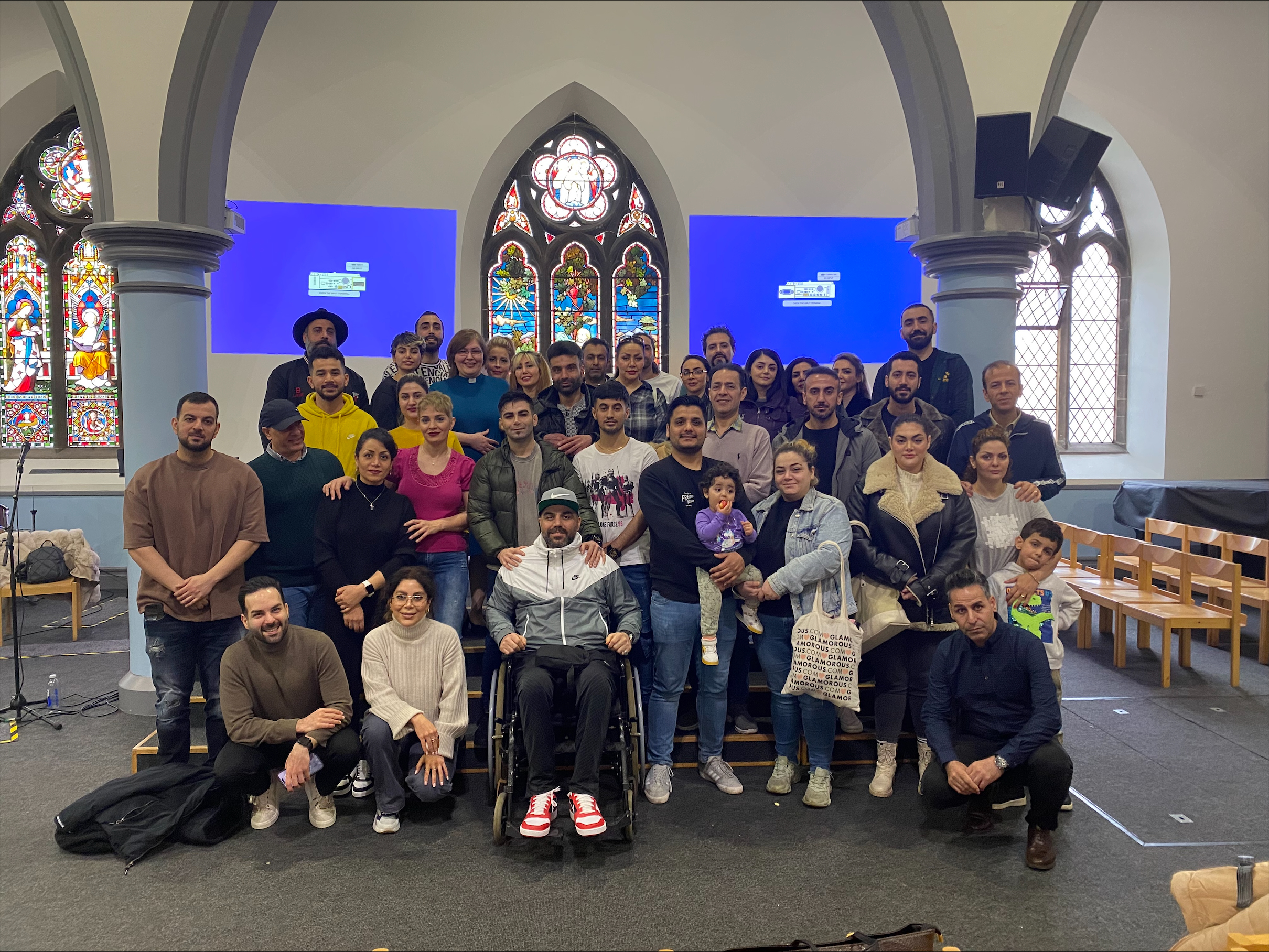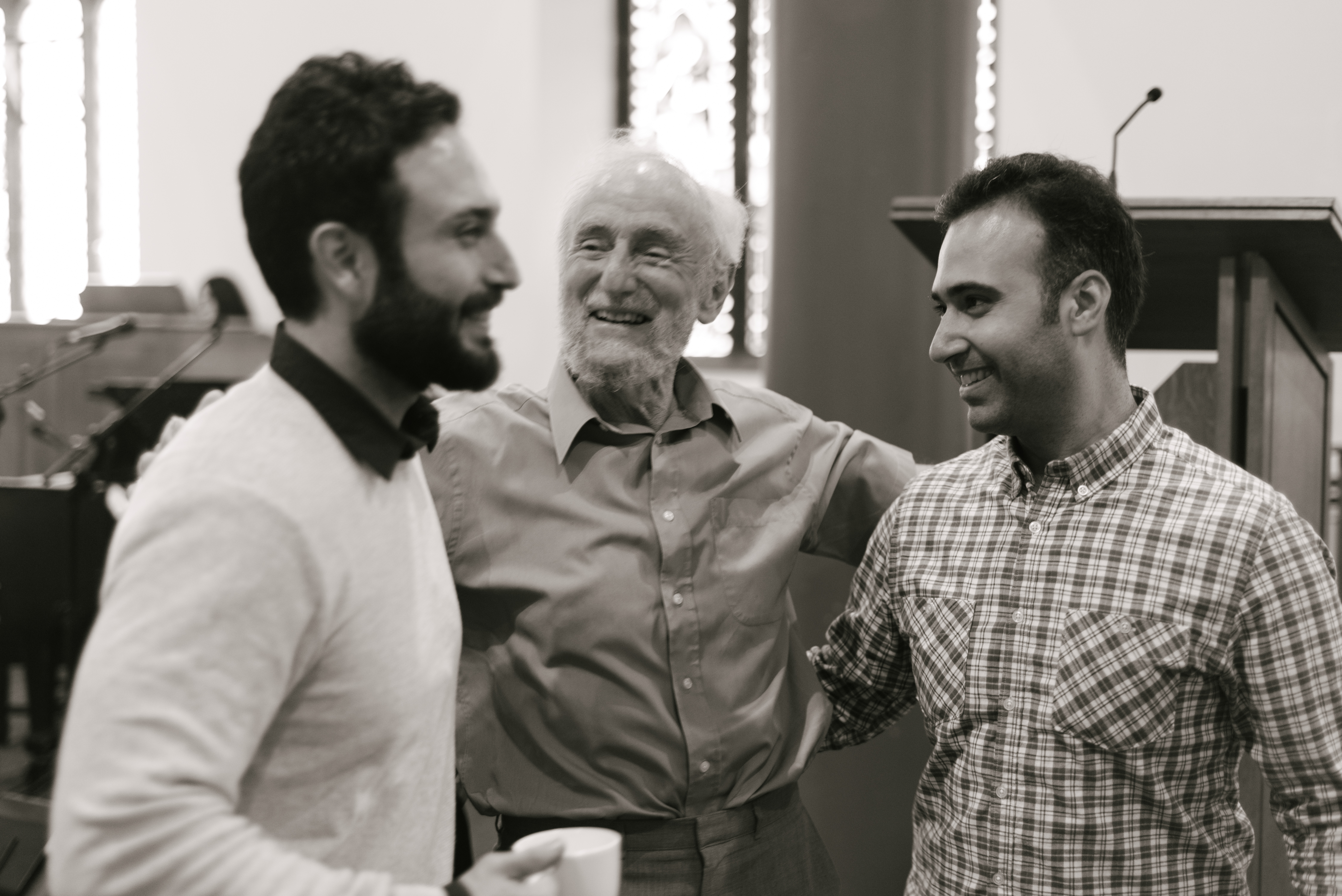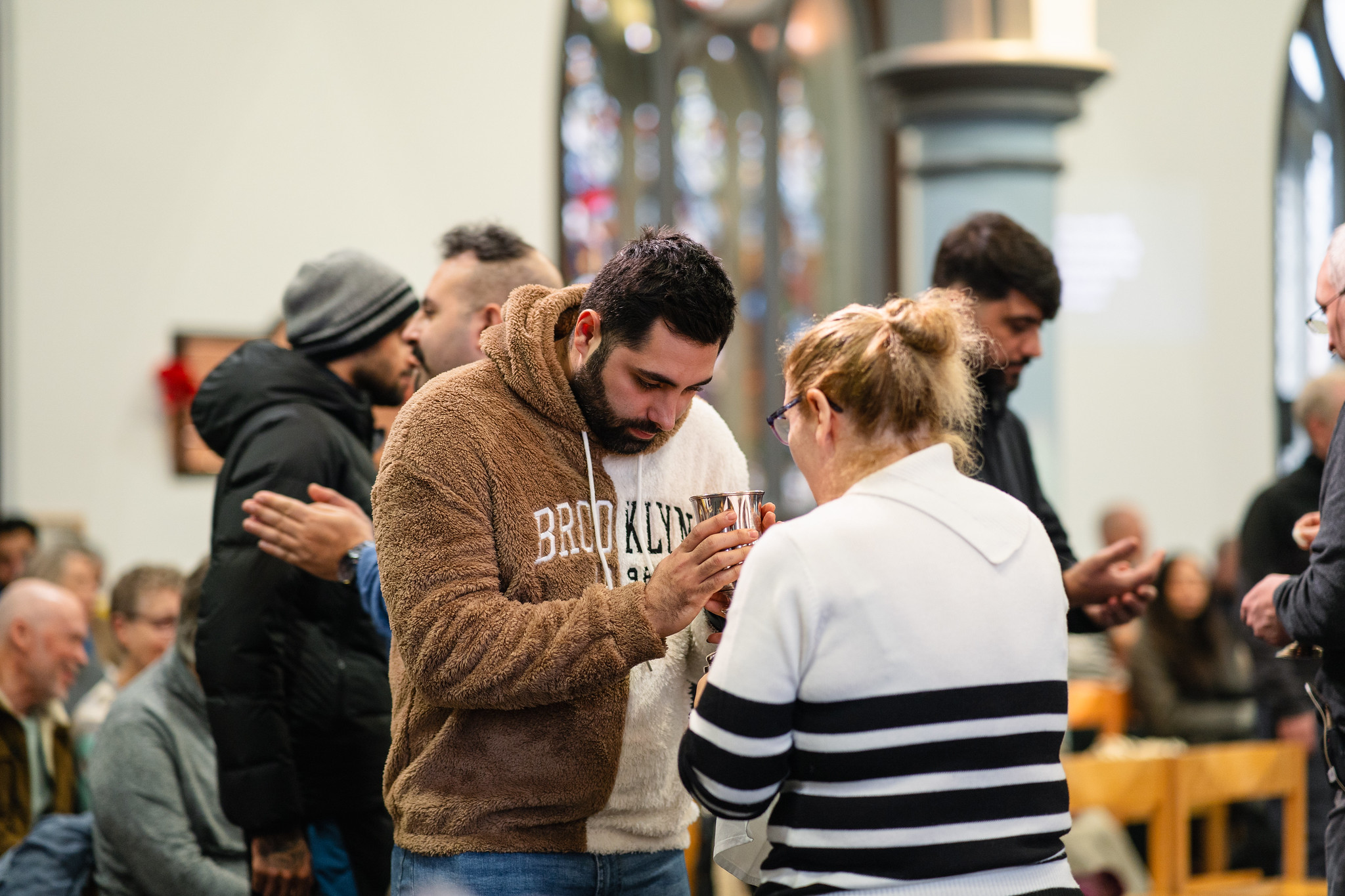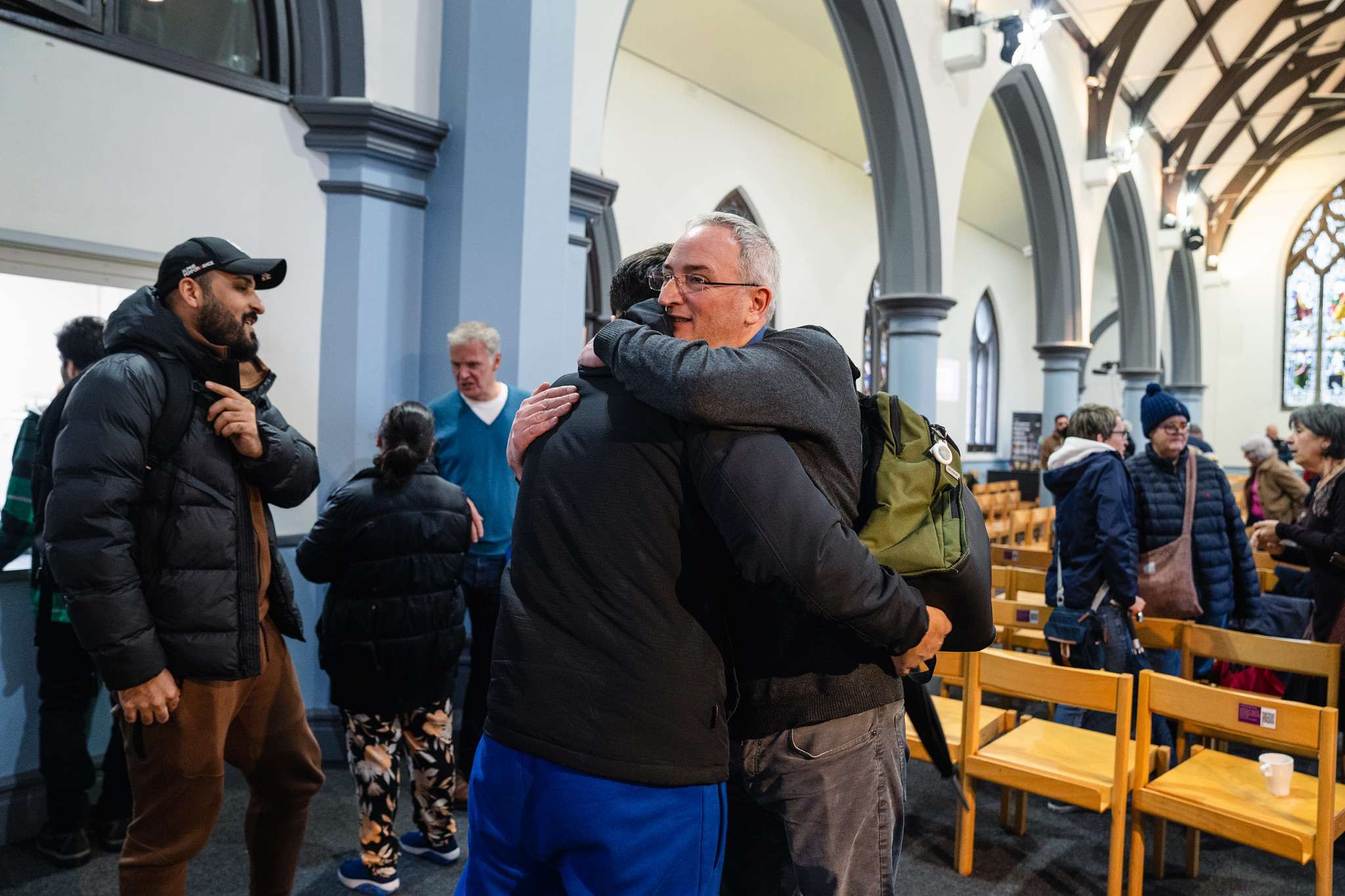 The Farsi community at St James and Emmanuel, Didsbury, has been growing for around ten years. What started with just a few Iranian church members now includes a large, thriving and diverse congregation.
The Farsi community at St James and Emmanuel, Didsbury, has been growing for around ten years. What started with just a few Iranian church members now includes a large, thriving and diverse congregation.
Revd Nick Bundock and Revd Katrin Alldavoodi have been busy at the church, cultivating an atmosphere where all people can come and feel at home. “They come and feel a sense of belonging, which is very important, especially for asylum seekers”, Nick says. “They are very vulnerable, have been rejected from their country, and they can come here and feel safety and belonging to this congregation and community.”
At the core of what they do at St James and Emmanuel are three values: ‘Belonging, Believing, Becoming’. “We find that if people have had a warm welcome and we listen to their needs, they feel they can own their space in the community as much as anyone else. The value that we really love is ‘becoming’, which takes it full circle. We aren’t just welcoming people; we want people to have fullness of life, too.”
This culture of welcome means that the congregation has continued to grow from just a handful of Iranian migrants in 2015. Their experience was so positive that word spread amongst the Farsi-speaking community, and more and more attended each Sunday. “We didn’t have any racial diversity in our church, but then we had a few people from Iran come. We looked up the Lord’s Prayer in Farsi and it started from there! Now, Katrin oversees an entire congregation of Farsi-speaking Christians”, explains Nick.
Over the last ten years, Revd Nick and Revd Katrin estimate they have carried out around 250 baptisms for Farsi adults, with 110 people confirmed in a single service last July. These people have all become active members of the parish. Originally, both the Farsi and English-speaking congregations would worship together, but they had to introduce a Farsi service as there were simply so many people attending. Farsi services are led by Katrin and translations are available for anyone who wants to partake in the  English-speaking service, with the same readings read at both to ensure continuity.
English-speaking service, with the same readings read at both to ensure continuity.
Many Iranians still choose to come to the English-speaking service, and to accommodate this a translation system is used. Everyone who needs it gets a little earpiece which can be worn on one side, so they can hear everything going on with the service and can also hear the translation simultaneously. The translator will then speak into a microphone which links to the earpieces. It is a great use of technology to ensure people can join in, in whatever way they would like.
Beyond the usual services, the migrant community are supported both pastorally and practically. Nick and Katrin recognise that a big part of helping asylum seekers is assisting them as they transition into being full participants in British society. This works in tandem with the Christian faith, so they’re working on a spiritual level and on a very practical level too.
Every Wednesday and Friday, Revd Katrin sets aside pastoral time for the Farsi-speaking congregation. Many have been through tough experiences and can have a strained relationship with God as a result. Katrin works with them to mend their relationship with God by being with them and empathising with what they have been through. As an Iranian and a priest, this is something which Katrin has an innate understanding of. She gives people hope that they too can build a life for themselves here, showing them leadership modelled from their community. “Most of my pastoral time I spend bringing people closer to God. One of the very important roles of a pastor is working individually with their flocks”, she says.
 Revd Katrin also leads a Farsi Bible study group every Tuesday where she teaches the reading that will be preached on Sunday, so they are already aware of it and have had the chance to consider it beforehand.
Revd Katrin also leads a Farsi Bible study group every Tuesday where she teaches the reading that will be preached on Sunday, so they are already aware of it and have had the chance to consider it beforehand.
There are also many practical ways in which Revd Nick and Revd Katrin help the Farsi-speaking community. One of the biggest difficulties is trying to keep their Iranian church members from becoming homeless once they’ve been granted asylum. Once they’ve been given refugee status, they have only a matter of weeks before they are no longer housed by Serco Housing, so need to find new accommodation – something which is extremely difficult as they have been unable to work. As a result, several of the congregation have spent nights on the streets and park benches after having received asylum. Revd Nick is currently working with a local councillor in Didsbury to come up with a solution to this problem. “I can’t bear the thought of people we know spending a night outside in the winter”, he says. “If you’re going to do this kind of work you can't just wish it all away. These are people who come with real needs.”
As well as the clergy there is also plenty of lay involvement in the group, with many church members getting stuck in to support the Farsi community. “It is truly a whole church effort”, Revd Nick says, “When you come to the door of the church you’ll be welcomed by a Farsi speaker on the welcome team or a longstanding British church member. It’s the same in the kitchen making the teas and coffees, with a mixture of both communities – we see everyone as just one community because everyone is so integrated.”
Part of this integration involves celebrating traditional Iranian festivals such as Nowruz and Chaharshanbe Suri, along with arranging Christmas dinners, Easter celebrations and more. Speaking of this coming year’s Chaharshanbe Suri which takes place in March, Revd Katrin says “Everything has been booked and is ready to go… We are cooking for them, preparing everything, and having a party in the church hall for everyone to come and feel that they are at home – there will be lots of joy and dancing involved!”
 Just as the church supports them, the Iranian community also give back to the church in many ways: cooking Iranian food for the congregations, getting involved in church life, and showing hospitality to all they encounter. “Iranians, they are very warm people, they are very friendly”, Revd Katrin explains. “They just have to come and say goodbye, they have to say hello, it’s part of their culture.” Revd Nick notes that this makes everyone feel accepted, from both sides of the congregation.
Just as the church supports them, the Iranian community also give back to the church in many ways: cooking Iranian food for the congregations, getting involved in church life, and showing hospitality to all they encounter. “Iranians, they are very warm people, they are very friendly”, Revd Katrin explains. “They just have to come and say goodbye, they have to say hello, it’s part of their culture.” Revd Nick notes that this makes everyone feel accepted, from both sides of the congregation.
Whilst serving different cultures together is fruitful, it’s not without its challenges, and it can be especially difficult when people move away. “You get to know people well and then once people receive their asylum they move; life takes them away from the congregation and area” Nick says. Some are moved, some go to live with relatives, and some go back to university to study, although people will often reconnect later down the line.
This is a testament to the hospitality of St James and Emmanuel, a place people know they can come to without judgment. Ultimately, Revd Katrin says, people know they can come from anywhere and feel accepted. “Sometimes people are afraid to accept others because they think they’re different, but I really want to say they shouldn’t be afraid of accepting other people. We are the same brothers and sisters in Christ. Even though we are speaking in another language, at the end of the day we will be together in heaven, so why don’t we try to be sisters and brothers now?”
You can find tips on creating a culture of welcome at your church on our Intercultural Mission page.